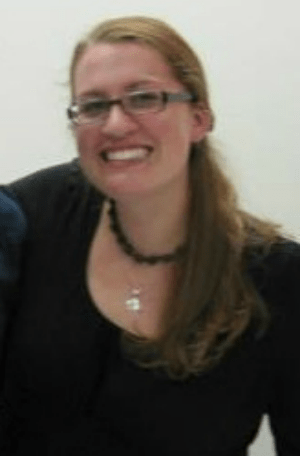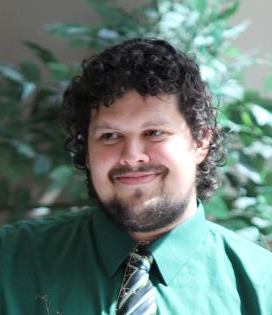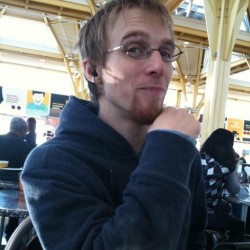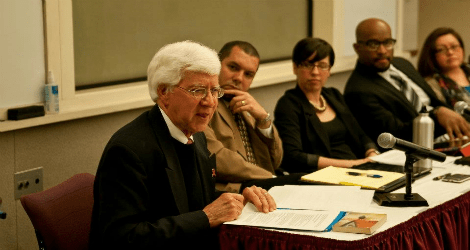McCormick Theological Seminary
What McCormick has modeled for us is that if we love each other in deep need, across boundaries, and, especially, at the table, community is possible.
By Abby Mohaupt and TC Anderson View and print as PDF.
View and print as PDF.

At McCormick Theological Seminary, we are family, building beloved community. This community finds ways to support each other in grief and across differences. When a student’s brother gets sick, we grieve with her, and when she cannot afford to go home, we pitch in and buy a plane ticket. And when difference threatens to divide us along liberal and conservative, gay and straight, affirming and non-affirming lines, we sit down together and we talk. That is McCormick justice: social justice flared with love.
Because we are a family and that is what families do.
At McCormick, a PC(USA) seminary in Chicago, IL, the community of students, faculty, and staff is ecumenical by faith traditions, urban by social context, and multicultural by community. Our student body is invested in several student groups that are committed to doing justice, including Acts 10:15, a student group committed to working on issues involving people who are lesbian, gay, bisexual, transgender, and queer (LGBTQ) in the church and in the world. Our faculty and staff include directors of three centers: The Center for African American Ministries and Black Church Studies, The Center for Asian American Studies, and The Center for the Study of Latin@ Theology and Ministry. Many students and staff work with the Language Resource Writing Center (LRWC), which partners domestic students with international students to foster learning English and building intercultural relationships.
If you were to ask any McCormick student to share her favorite verse of scripture, she would likely point to Micah 6:8: “[God] has told you, human one, what is good and what the Lord requires from you: to do justice, embrace faithful love, and walk humbly with your God” (CEB). When we talk about justice, we often point to this verse because of the first part: do justice. At McCormick, while we embrace this first part, our strength is really in the second part: embrace faithful love. These two pieces of Micah 6:8 are dependent upon each other in order to build a beloved community of faith—in deep need, across boundaries, at the table. While more traditional models of justice are being practiced at McCormick, this model represents our unique grounding in love for each other.

In deep need
In the fall of 2009, Lisa[i] entered McCormick as a Master of Divinity student. She moved to Chicago from the West Coast of the United States, leaving behind her parents and brother with a mix of excitement and apprehension. It was not necessarily the distance that precipitated these feelings. Lisa had lived in Latin America previously, so their family was used to distance. One of the things that made this move hard, however, was that her brother had a medical condition that meant he was often in the hospital. In the spring of Lisa’s first year, she learned that her brother would get the lung transplant he needed. She was thousands of miles away from her family as they all grieved this tremendous need, and she was still far away when the surgery happened that April. Many students rallied around Lisa, holding her family in prayer and hope.
That summer, Lisa went home to be with her brother and parents; she kept in close contact with her friends in Chicago. When her brother died, succumbing to illness, a group of McCormick students sent her a love package filled with reminders that our community was thinking of her and her family, and that we would welcome her back to us when she was ready. She returned to McCormick in the fall, and the community knew she would not be able to go home again soon for financial reasons. For Thanksgiving—the first major holiday since her brother’s death—students collected funds to send Lisa home to be her with parents. The next summer, Lisa was working in Chicago and could not go home for the first anniversary of her brother’s death, so students threw her a party—not to help her forget her mourning, but to help her remember and celebrate her brother. We could not replace her brother or her parents in these moments, but we could be the community that held her.
What is remarkable about Lisa’s story in our community is that hers is one of many stories of students, faculty, and staff who have been loved by the McCormick community in their deep need. In our time at McCormick, we have seen our community face many losses. When a staff member’s house burned down, the community responded by collecting basic items for her new home. All faculty and staff members took a pay cut in the recession so that fewer employees would be let go, and the student session responded by voluntarily asking for their own pay cuts. Most recently, a student and his family lost a child after a long illness, and the community responded by collecting money for gas to the hospital, caring for the family’s other children, and preparing a memorial service.
These specific examples of caring for each other in need are held up by deeper foundations of weekly community prayers and concerns that the Dean of Students shares by email (so that even commuter students can pray for members of the community), a budding prayer room organized and perpetuated by the Deacons, and our weekly Community worship services. As a community of faith, we have sought to embrace a more faithful love for each other by responding in concrete ways to the needs of members of the community.
Across boundaries
One of the most unique aspects of McCormick has been our intentional work toward being a multicultural and ecumenical seminary. We would be lying if we said that we have succeeded; McCormick is still very Presbyterian and is still influenced by systems of oppression like racism, sexism, homophobia, and classism that pervade most institutions in the United States. But, McCormick continues to struggle self-consciously against these systems in our community.
One student group has worked hard to cross boundaries that often exist in these systems. Acts 10:15 (the LGBTQ student group) has intentionally sought to have conversations about sexuality with different parts of the community. Last year, the group sponsored monthly lunch conversations that explored issues around the intersections of sexuality, racism, biblical interpretation, and ecumenism. The group itself is mostly composed of young, liberal, white Presbyterian students, so the work to include other voices—even voices that disagree—has been intentional. For the last several years, Acts 10:15 has sponsored Speak Week around their observance of the National Day of Silence. This week of events includes art projects, meals, acts of service, lectures, panel discussions, and conversations. Last year, the week included a community conversation that sought to engage voices who disagreed about the place in the church for sexuality and people who are LGBTQ, emphasizing listening and song rather than debate. Earlier this year, Acts 10:15 hosted a conversation in the LRWC with international students talking about sexuality around the world. These have been risky and often painful conversations that have required members of the community (on many different sides of issues of sexuality—gay/straight, liberal/conservative, affirming/not-affirming) to be vulnerable about our identities and beliefs. In the context of McCormick, these hard conversations have not been easy, but they have mostly happened in open, loving ways. Members of our community who identify as LGBTQ have increasingly found that they have a voice in the community. And we have learned that it is hard to trivialize these conversations when they involve people coming together in love.
At the table
Almost every week when classes are in session, our community gathers to worship together. Our worship services are reflections of our diverse community in music, liturgy, and Word. Almost every service includes a celebration of communion, followed by a community meal. At a recent community worship service, TC pointed to the importance of the table in his personal family and in the family that makes up the McCormick community.
When he was younger his family would always eat together; no matter where his sister and he were, his mom would whistle and they knew it was dinner time! They would gather and have a family meal every night and talk about their days and their problems and good things that happened and things that were coming up. When he got older he did not like this as much. He did not want to spend his time with his family and so he did not care to do a family meal. But his parents insisted, and not in the “oh come on, please eat with us,” way. More in the, “You’re going to eat with us or you’re going to find your own place” way! When he asked his dad why, his dad said simply, “Because we’re a family and that’s what families do!”
Because we are a family and that is what families do…
TC didn’t know how profound these words were when they were first said, but he can hear them now. We are a family and that’s what we do. What he did not understand then is why? Why the table? Why not watch Jeopardy every night? Why the inconvenient and time consuming table?
And now we know, because things happen at the table that just do not happen anywhere else. Conversation, altercations, and resolutions happen at the table. Communication happens at the table, not monologues, but dialogue, trialogues, quadralogues happen at the table. Healing happens at the table. Fellowship, joy, deep sadness, comfort happen at the table. Love happens at the table.
Church happens at the table. Even Presbyterian church happens at the table! Here’s how we know. There is an order to the table. We prepare it, we bring ourselves to it, we pray, we fill ourselves, we talk about joys and concerns, and sometimes for some people the table may run a little long! So why the table for us? Because, we are family and that is what families do!
At the table, the community gathers over food from local restaurants. Students, faculty and staff sit together to talk about their weeks, their classes, their assignments, their families. At the table, the community gathers for a moment in the life of the community to eat together, laugh together, cry together. At the table, we gather together after just praying and praising and singing together. At the table, we remember that we are not just students, faculty and staff, but also a community together.
Admittedly, the Centers would likely benefit from more money (so that they could do more programming) and more staff (though the current staff in the Centers are phenomenal). There is much work to be done and more hands make for more possibilities. But those hands come from many places. Our brand-new president, Rev. Dr. Frank M. Yamada, was supportive of student groups when he was “just” an Old Testament Professor; he was part of the Acts 10:15 lunch conversations and he presided over the communion at the Eco-justice worship service. He continues to support the work of students, faculty, and staff in his new role as president.
As we leave McCormick (since we both graduate in May!), we are aware of our denomination’s need to do more anti-racism work, to be more intentional about creation care, to be more inclusive of all whom God calls to the table and to God’s church. Our denomination needs to have a wider vision of what ministry looks like.
All of this work—programs, centers, training—will mean nothing, though, without a foundation of love. What McCormick has modeled for us is that if we love each other in deep need, across boundaries, and, especially, at the table, community is possible. Here we have found—and helped build—a community that does justice every moment in love.
Notes
[i] The student’s name has been changed.
________________________
TC Anderson is a multiracial senior in the Master of Divinity (M.Div) program at McCormick Theological Seminary. Originally from Metro Detroit, TC feels called to youth ministry. Abby Mohaupt is a Master of Theology (Th.M.) student at McCormick Theological Seminary, where she also earned an M.Div. Abby’s research interests include environmental theology, pastoral care and their intersection in family systems theory.





Unbound Social